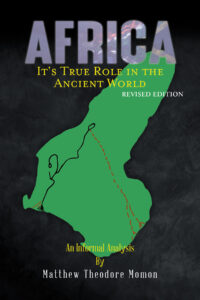Book Reviews

The US Review of Books
 Africa: It’s True Role in the Ancient World
Africa: It’s True Role in the Ancient World
by Matthew Theodore Momon
Aspire Publishing Hub
book review by Mihir Shah
“Before the European met the African, he was an ignorant Barbarian living in caves. The African later transformed them into thinking men.”
In any pedagogical program, educators are trained to promote inquiry, to encourage their students to probe deeper, and to ask who, what, where, when, and why. Momon’s work exhibits the same instructional tendencies as it challenges preconceived notions using a background in STEM, specifically math and science, alongside extensive research. At its core, though, this is the work of an inquisitive mind, an intensely curious individual who is unyielding in his intent to help both himself and his readers navigate through the labyrinth of human history to ultimately uncover hidden truths.
While there are numerous conspiracy theorists who have transformed their ideas into literature, Momon’s work distances itself by using concrete and relatable examples, both historical and contemporary, with which his readers can form a connection. Undoubtedly, one of the intriguing aspects of the entire compilation is the author’s fearless voice; he adheres loyally to his truth and his beliefs that the legacy of Africa has been severely tampered with and rewritten by the Europeans. In the process, he examines an infinite range of topics, spanning everything from religion and academic systems to the countless contributions and innovative nature of Black America. As the author progresses from example to example, the discourse becomes less of an “agree or disagree” and more of a thought-provoking and unconventional yet powerful way to interpret history.
According to the author, there is a deliberate and blatant attempt at suppressing the African American legacy and its contributions to society. For instance, he notes that there are over two thousand patents earned by African Americans between 1865 and 1940, yet names like Elihag McCoy, John Hanson, and Albert Robinson are buried deep in the history books and, often, altogether nonexistent. It is difficult to argue against the author’s notion that the portrayal of African culture is downright inferior, the “personification of a criminal.” While citing the histories of Egypt and using examples of Isis/Osiris and the pyramids of Giza, he not only creates parallels and discerns similarities between African and Greek names but also pleads with African Americans to awaken and embrace their true identity as an ancient, highly intelligent culture with unlimited capacities.
From the Roman culture being born out of disdain for Africans and Cleopatra’s forced suicide to references to Socrates, Aristotle, and Emperor Constantine, Momon’s work transforms into a chronological account of monumental inflection points in all facets of human history. Astoundingly, he denotes that it took the Europeans 1,918 years to gain control of Africa for themselves. He doesn’t stop there, either, demonstrating how the majority of athletes in the major sports (e.g., NBA, NFL) are black, citing how former players like Shaq tower above the rest of society and are revered like gods in their own right.
Tying his entire argument through science and math, with references to Mendel and Punnett squares, he appeals to modern society by using popular movie offerings like the Matrix series and demonstrating how the city of Detroit is the ideal African city, a spitting adaptation of downtown Alexandria. Momon states that math and science are the languages of the universe, the bedrock of civilization. African mastery of math and science makes it unquestionable just how potent of a culture it was, is, and continues to be. Ultimately, Momon’s work is comprehensive and insightful, an investigative survey of historical proportions with the potential to reshape how one views the events of the past as they are applied to the perceptions of the present and future.

Blueink review

Africa: It’s True Role in the Ancient World
Matthew Theodore Momon
Publisher: Aspire Publishing Hub
Pages: 198
Price: (paperback) $11.99
ISBN: 9781964393117
Reviewed: August, 2024
Matthew Theodore Momon’s Africa: It’s True Role in the Ancient World is devoted to the discoveries made by Africans and people of African descent throughout history. Most importantly, he writes that he intends to show “where the origin of the western world really begins.”
The author posits that the European version of history is “a hoax trumped up to make (Europeans] look superior” and proceeds mostly chronologically, albeit with frequent digressions, through the Ice Age, Greco-Roman world, Middle Ages, Renaissance, European conquest of the Americas, and Napoleonic wars. His approach is informed, he writes, by his experience “teaching math and science as a tutor, teacher and a professor.” The intended audience is “advanced mathematics and science students,” even though the book’s content in this vein mostly consists of speculative calculations, astrology and numerology.
Momon begins on relatively solid ground, with an impressive list (although with some errors) of great African-American inventors. Unfortunately, most of the subsequent text is consumed with far-fetched theorizing invoking classic fixtures of conspiratorial thinking, such as the Freemasons and the Knights Templar, and speculations about the treasures of Atlantis, King Solomon’s mines, and the Library of Alexandria.
Unhelpfully flipping anti-African racial prejudices on their head, Momon writes “blackness … is the natural state of man” and “no woman would mate with [a] blonde-haired blue-eyed man given a choice between him and the African.” Rather than credibly recounting Africa’s substantial role in world history, he claims “the Moors” established a global empire stretching into the Americas prior to the Europeans’ arrival, and thus became the ancestors both of various Native American groups and of most African-Americans. Notes of anti-Semitism are also sounded, with references to “the secret hierarchy of Rabbi’s” [sic] and the first slave ship out of Africa “owned by the Jewish people known as the Sephardim.”
Such issues create a problematic read overall. In sum, the laudable goal of tracing Africa’s intellectual contributions to humanity awaits another author to fully do it justice.
Foreword Reviews

Africa: It’s True Role in the Ancient World
Matthew Theodore Momon
Aspire Publishing Hub (May 31, 2024)
Softcover $11.99 (198pp)
978-1-964393-11-7
Taking the form of a dialogue between the past and the present, the social science inquiry Africa addresses topics including education, equality, ethnicity and race, epistemology, and history.
An impassioned quest to uncover the hidden mysteries of ancient history, Matthew Theodore Momon’s text Africa compiles lists of the historical contributions of Africans dating back to antiquity.
An alternative account of ancient history, this book posits that most known intellectual contributions and technological advancements have been misattributed to protect ideas of European supremacy and to persecute African psyches. Its inquiry is as personal as it is political, and it is narrated with a tone of radical urgency: “African Americans have made significant contributions to science despite the absence of at least two basic conditions for scientific work; #1 Freedom from full-time pressures for personal survival and #2 A stimulating cultural environment.” It continues, “If the African ever has questions about himself, he has to do his own research.” To correct the record, it reckons with historiography, scrutinizing the factors influencing how history was written and who wrote it.
However, the book’s claims are not supported well enough to make it seem a credible source on ancient history. Its fleeting and casual mention of Egyptologists’ schools of thought about historical timelines in ancient Africa is as close as it comes to citing a scholastic source; its research methodologies remain murky. It has no bibliography, but includes a few rogue citations. Its data is often attributed to decades-old documentaries on the Discovery Channel. Furthermore, its analyses are rendered in frenzied mathematical equations with figures of unknown origins. It includes oversimplified deductions that, sans sources, appear tainted by confirmation bias. Alongside errors in grammar and indecipherable illustrations of maps without legends and figures without subtext, it submerges its message beneath conjecture.
The book often blurs the historical record, marrying facts with Bible verses and proffering a pseudospeculative archive of Africa’s history as though the continent existed in a vacuum. The rigidity of its ideas is a constant throughout, and the gaps, nuances, and ambiguity inherent to conducting research into the ancient past are brushed past. In the end, the book does not as much correct the script as flip it in support of the idea of African supremacy. Its arguments also fall prey to tribalist perspectives on race, rendering it contentious.
A piquing historical inquiry that proposes a paradigm shift, Africa is an enthusiastic and impassioned thought experiment.
Reviewed by Xenia Dunford
August 24, 2024
